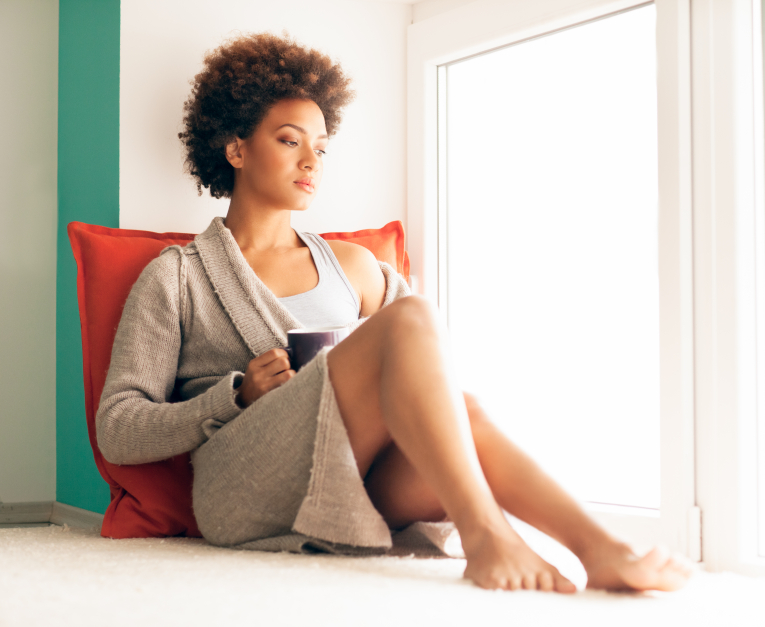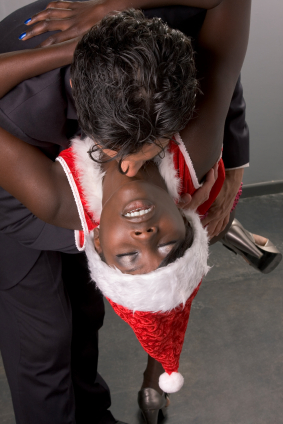The holiday season can give us time to reflect and look back. When I was in my early 20s, I was diagnosed with bipolar disorder. You could say I know my depression well – I may have gotten my official diagnosis in college, but my illness and I grew up together. We’re homies. It’s always there for me, even when it isn’t “active”. I’ve literally had more depressive episodes than I can count – my manic episodes have been rare, and though they are toxic and ruinous, it’s the depression that threatens me the most. It’s like my diabetes – a chronic disease. My depression follows me to sleep at night and awakens with me in the morning. It’s with me when I’m driving, eating, reading and hanging out with my son.
Thankfully, with a lot of hard work and help, I’ve managed to avoid falling into that cold, dark void where my depression flourishes. But it hasn’t been easy. Like everyone who’s lucky enough to live long enough, my life has taken some rough turns – losing my parents, my sister and friends. These things are relative, though: Life is hard for everyone. But, when you have a chronic disease like depression lurking in the shadows, even life’s normal bumps in the road can be treacherous.
And when you live in a community that doesn’t acknowledge mental illness, it can make it that much harder. In the Black community, the stigma surrounding mental illness and disease is still as pervasive as ever. Many of us rely on platitudes like “Pray on it”, “Take it to Jesus” or “Talk to Pastor about it”, instead of confronting the issue and talking about it with one another. We tend to sweep those symptoms we see in our loved ones under the rug or pass them off as quirks.
But silence is deadly when it comes to depression, as we’ve seen time and again. Substance abuse, domestic partner violence, rape/sexual assault and other violent crimes are often rooted in untreated mental illnesses. The only way to eliminate the stigma of mental illness in the Black community (and elsewhere) is to talk about it as candidly and as often as possible. We need to normalize the treatment of mental ailments the same way we view treating hypertension, heart disease or diabetes, all of which also plague African Americans in alarmingly high numbers.
Normalizing mental illness and its treatment can lessen the stigma associated with it. As the stigma lessens, so can our reluctance to seek help. And when sick people seek treatment and get better, it benefits not only the individual, but the community as a whole.
So, I join the chorus of people struggling with mental illnesses like depression and bipolar disorder, who have bared their souls in the hopes that it will encourage others to seek the help they need.
Sometimes my depression has been brought on by circumstance, and lately, things have been exceptionally difficult: Six years ago, my only sister died from complications from cancer. Soon after, both of my parents were diagnosed with cancer. In 2012, I had a heart attack, after which I underwent a triple bypass and suffered through many post-op complications. The night before my surgery, my teenage son was struck by a hit-and-run driver (I’m a single mom). He survived, but is still affected by that accident. I had a lot of help from friends and family, but being a single mother and the primary caregiver for two aging parents with cancer took its toll, mentally and physically.
I lost my mother in June 2014. Almost exactly a year later, I lost my father. In a relatively short amount of time, my immediate family of five was reduced to two. I was overwhelmed with grief and sadness – which is a rational response to everything that was happening. But when you suffer from a mental illness like depression, grief and sadness can be very dangerous.
Picture a door: just an ordinary door. For me, that door is a metaphor for my depression. If I open that door and walk through it, I walk into the land of hopelessness and despair. It’s kind of like Narnia and the wardrobe the kids used to get there. Only my depression isn’t a place of adventure and there’s no heroic lion on the other side. It’s a terrible, dark place, worse than you can even imagine.
Still, what’s on the other side of the door is familiar because even though it’s been a while, I’ve been there before. And because it’s familiar, it’s comfortable. I know it. It’s still scary because it’s a bad, horrible place. But it’s a bad, horrible place that I know. Since my last return from the other side of that door many years ago, I’ve had some rough times. I’ve experienced pain so deep that it took me right up to the door. I even had my hand on the doorknob a few times. But somehow, I’ve managed to resist opening and stepping through.
In fact every single time I’ve come close to opening that door again, something has stopped me. Sometimes it’s been something of my own doing, like realizing I’m in trouble and getting back into therapy or talking to my doctor about changing my medication. At other times it’s been as simple as forcing myself to get more physically active and eat healthier. But there have been times when other people have, without even realizing it, pulled my hand off that doorknob and led me to a better place.
The last time I stood at the door, I almost walked through it. It was January of this year and I was still reeling from losing my mom six months earlier. I’d also just turned 50 and was conflicted about reaching that milestone. And I was struggling to balance raising my teenage son and caring for my elderly, cancer-stricken father. I’ll admit that I’d taken my eye off the ball when it came to my mental health. I’d been so consumed with taking care of my dad and my son, it was all I could do to get from one hour to the next intact.
Then suddenly, out of the blue, one of my best friends died. This was the mother of all sucker punches, too. Only days before she died, we were making plans for my 50th birthday party. Next thing I knew, I was at her hospital bed, saying good-bye. I was shaken to my very core. Her death was the final catalyst that sent me flying right up to that dreaded door.
So there I stood, hand on the doorknob. I’d spent the entire day in bed, only getting up to do whatever was absolutely necessary for my son and father to have a normal day and not, you know, die from neglect. And there was that damned door, looking so inviting. I swear, I could hear it beckon to me like some sick pied piper. “Just surrender to the despair,” it whispered. “I’ll be so much better than that wrenching, piercing pain you’re feeling. Come on, Janice. Just give in and let the depression take over so you won’t have to think or remember or feel. No one loves you, anyway. Resistance is futile!”
You see, my disease is like that. It twists things around in my head so that up is down and front is back. It lies to me and confuses my thinking. And it came eerily close to convincing me that surrendering was the right, even smart, thing to do. But the disease didn’t win that time. And I can’t even take credit for it.
At one of my lowest moments, I got a phone call from one of my best childhood friends. She didn’t know it then, but her words pulled me back from the brink. As she spoke, I imagined myself slowly letting go of that doorknob and backing away from the door. What she said wasn’t particularly mind-blowing. In fact, I can’t even remember her words. She just talked to me like she always does, apparently saying exactly what I needed to hear. Thanks to that brief conversation, I turned my back on that door and haven’t been close to it since. Even when my father died seven months later, I stayed away from that damned door.
But I know it’s there. I’m more aware of it these days because of my grief. I always have to check myself: am I just feeling sad (and justifiably so) or am I spiraling? Is that the door I see or just an apparition because I miss my sister or my parents or my friend? I’ll admit that there were some days when my grief was indistinguishable from my depression. It really has been a rough few years for me. But I knew that door was still closed when, even after weeks of stagnant sadness, I could still somehow function. Another sign that I was still on this side of that damned door was that I always saw the light at the end of the proverbial tunnel. When I’m really depressed, all I see is darkness.
I don’t want my story to imply that mental illness can be controlled or treated by a phone call or the “will” to stay healthy. It can’t. I treat my mental illness like I treat my physical illnesses, with medical intervention and expert care. It’s just with everything else that’s been going on, I haven’t been diligent about either. I resolve to change that, though.
This is a battle that I’ll be fighting for the rest of my life. My disease is insidious and horrific. It’s the scary boogey-man, hiding in the shadows just waiting for me to let down my guard.
But I don’t fight alone. And since I’m not alone, my battle seems less daunting. I’m armed with the weapons that work for me: an amazing support system, professional care and medication. These weapons make winning seem possible.
And I really want to win. I want all of us to win. So I hope that by sharing my story, others will get help with their fight, too. Consider these statistics: According to the Health and Human Services Office of Minority Health, African Americans are 20% more likely to experience mental health problems than the general population. Tragically, only 25% of Blacks with mental illnesses seek professional help, compared to 40% of whites.
The most common mental disorders that affect African Americans are major depression, ADHD, suicide (among young Black men) and PTSD. Black children are most likely to be affected by PTSD because they’re more likely than their white counterparts to be victims of violent crimes. Untreated, those children will be more likely to grow up (if they survive) to commit violent crimes, continuing the tragic cycle.
We can go on and on about how misinformation about mental illness among Blacks is to blame, and how a heavy reliance on faith-based communities is keeping us from getting the care we need. And yes, sometimes faith-based communities can actually hurt more than help when they become places of shame and stigma instead of places of solace and relief. We need to do a better job of educating church leaders about mental health issues, because Black folks ain’t leaving their churches, anytime soon.
Understand that for centuries, African American reliance on faith communities for counsel on all matters has been the standard. For too long, our churches were the only places we felt safe and in control. We were fed physically and spiritually in church in ways we could never be in our everyday lives. Out in the world, we were “boy”, “gal”, and at the beck and call of our white rulers. But in our churches, we were “Deacon”, “Mother”, “Pastor”, “Ma’am” and “Sir”. And the same is still true today.
Getting more churches on board with mental health awareness is key. But there are other barriers to Blacks getting the mental health care we need, as well. One major issue that I’ve personally had to deal with is the lack of cultural competence by health professions when it comes to dealing with Black people and mental health problems. Never mind that only 3.7% of the members of the American Psychological Association are African American, itself a major problem. But when your only choices for help are people who can’t relate in any way to your life experiences, it can be challenging finding the right fit in a therapist or doctor.
I can’t tell you how many white, well-meaning therapists I went through who wanted to paint me with the broad brush strokes of what they understood a “typical” Black woman to be. Therapists are human and have their own biases and prejudices. I actually had to spend an entire session convincing one therapist that while I’m a Black woman from Detroit, I’ve never actually witnessed anyone get shot and that even my great-grandparents were college educated. I think I made her head explode. Needless to say, I didn’t go back.
So even if you can penetrate the stigma, the church’s influence and family shame to finally convince Black people to get professional help, finding the right help is often so daunting that many people quit trying.
I know I’m lucky. While we don’t sit around and discuss mental illness during Thanksgiving dinner, my family has always been open to turning to the professionals for mental health care. But even in my open and progressive family, we should probably talk about it more. At a minimum, we ought to share resources, especially as there are a lot of theories about mental illnesses being hereditary.
I also have an amazing support system: a small online community of women of color who struggle with mental illness, with whom I can share ideas and strategies to cope; a group of amazing, lifelong friends who’ve never shamed me and who offer exactly the kind of support I need; an extended family who loves me unconditionally, even when I least deserve it; and I write. Writing often keeps that damned door at bay.
If you or someone you know is fighting mental illness and needs help, please call the NAMI Helpline (National Alliance for the Mentally Ill) at 1-800-950-NAMI. No one should have to fight this battle alone.
Janice Fuller-Roberts is a Detroit-based free-lance writer. Her work has appeared in Dame, For Harriet and other publications.










